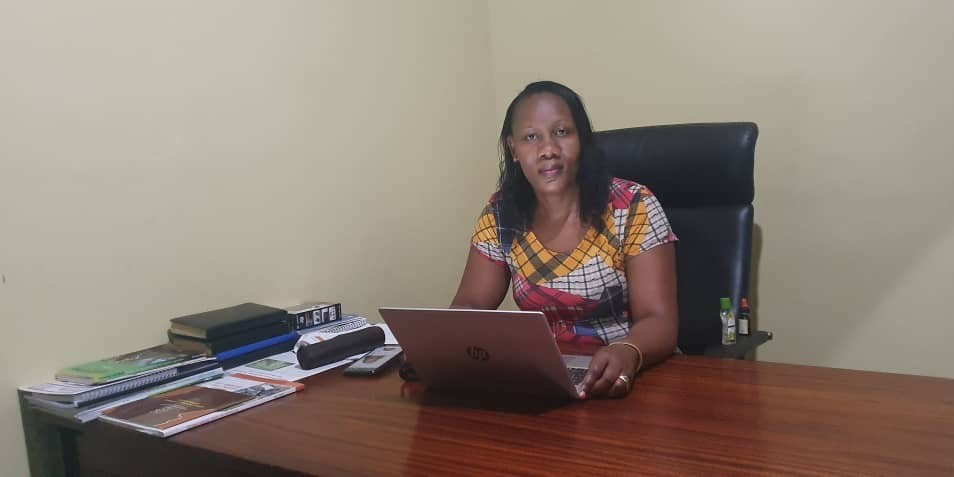Spotlight interview – Dr Felly Mugizi Tusiime

Dr Felly Mugizi Tusiime is a Biodiversity and Environmental Management specialist, with PhD in Environmental Management from Makerere University Uganda and University of Oslo, Norway; a joint Master of Science in Botany from Makerere University Uganda and Imperial College London UK, and a Bachelor of Science (Botany zoology) degree from Makerere University.
She has 17 years’ work experience with about 7 years in senior leadership and management positions. She has done extensive research in biodiversity, land degradation-restoration, climate change and environmental management including policy NDC, and SDGs.
She started her career with teaching and research in Biodiversity, Environmental Sciences and Conservation Biology at Makerere University; also as part-time lecturer in Gulu, Busitema and Kyambogo Universities in Uganda. She has worked at the Natural History Museum London UK; National Museum of Kenya Nairobi; Addis Ababa University Ethiopia, Sokoine University of Agriculture Tanzania, University of Oslo Norway. She worked in academics (university environments) for about 11 years and during that time, also pursued her Masters and Ph. D degrees.
She is currently the Head of the Climate Change and Environmental Sustainability Program at Africa Innovations Institute (AfrII).
Dr Akan Odon recently interviewed Felly to find out a little more about her and her opinions and experience in the bioenergy sector.
Give us a sense of your current work affiliations
As head of Climate Change and Environmental sustainability program I link our institution AfrII to partners in government and non-state institutions in Uganda and abroad. I am responsible for oversight and effective implementation of climate change mitigation and adaption activities at AfrII and work in close partnership with government and non-state actors. We provide technical support, capacity building/training sensitisation and public awareness on activities and programmes on climate change and environmental sustainability. Gender is mainstreamed in all our program activities. We analyse research findings to guide decision-making at the local government and national level. As part of capacity building and sensitisation we generate evidence (factsheets and policy briefs) to support assessment and review of climate change policies, laws, programs and practices. I lead in building or strengthening and maintaining strategic partnerships with government and non-state actors at the national, regional and international levels.
Our Key government partners include: the Climate Change department Ministry of Water and Environment, Ministry of Energy and Mineral Development, National Environment Management Authority, Ministry of Agriculture Animal Industry and Fisheries, National Forest Authority, Ministry of Works and Transport, Ministry of Trade Industry and Cooperatives, and Ministry of Local government. We work with academia Makerere and Kyambogo universities, the private sector (industry/business community, SMEs and smallholder farmers), civil society organisations e.g. Climate Action Network of Uganda, and Nature Uganda as well as the development partners. We have international partners (universities, research institutes and development partners) in different parts of the world.
How did you get to hear about and engage with RECIRCULATE as a project?
I learnt of RECIRCULATE from our CEO Prof. George W. Otim-Nape who identified the synergies between RECIRCULATE at the Lancaster University and AfrII.
What has been your experience engaging with the RECIRCULATE project so far?
I had a great experience meeting diverse expertise at the Botswana KE workshop, and sharing so much knowledge in such a short period. It was amazing to learn the power of diversity and interdisciplinary approach to research and KE as well as appreciate the role of working with and for the communities; e.g. linking industry to research and academics. My take home message was the power of community engagement and partnerships for transformational impact
What do you consider the two biggest challenges that research faces in Africa?
- Low or lack of political will to fund research is the biggest challenge that research faces in Africa. Most research is foreign aided, and locally, knowledge generation is not high up on the political agenda yet knowledge is vital in informing decision-making at all levels.
- The second major challenge is limited capacity to do research. There are capacity gaps at institutional level, limited structure and facilities for state of the art research as well as limited skilled personnel to support capacity building in research.
What are your views of the state of bioenergy in Africa-what are the challenges you see?
Bioenergy is the main option for Africa because it is affordable by the majority. Most African populations rely on solid biofuel mainly biomass (fuel wood and charcoal) for energy supply in residential and commercial facilities. The biomass is however unsustainably harvested from the natural ecosystem. This has contributed to massive loss of tree cover, environmental degradation, and climate change. On the other hand, lots of waste biomass is unutilized and piles up causing health threats and polluting the environment (release of greenhouse gases), yet this waste could be converted into bioenergy and biofertilizer.
Africa has limited technologies and expertise to drive innovation in bioenergy especially for large scale production. The fossil fuels e.g. diesel/petrol cost cheaper than liquid biofuels e.g. ethanol or biodiesel.
Are there opportunities you think can be explored bearing in mind these challenges you highlighted?
The waste challenge is a big opportunity for the energy sector in Africa. There is bio-waste everywhere, and we could innovatively transform the waste into solid biofuels e.g. brikette, liquid/gas biofuel e.g. biogas, ethanol, biodiesel e.t.c., which will reduce the waste as a hazard and contribute to emission reduction and climate change mitigation. Waste water, bagasse and wood waste are being used to generate heat, energy and electricity in some industries in Africa even here in Uganda, this is great! I am however not comfortable with biofuel sources that compete with food security in Africa. For example instead of using cassava or maize (corn) for ethanol production, am more comfortable the ethanol is obtained from molasses in the sugar factories and from other waste. It is best to recycle and transform our waste waters and solid waste to clean energy for domestic and industrial use.
There is lots of renewable energy e.g. solar and wind which can supplement bioenergy in Africa
In your view what are the two key sustainable development goals that you believe RECIRCULATE addresses as a project and which two goals should it be addressing even more?
RECIRCULATE is addressing mostly goal 7, affordable reliable sustainable energy for all; and goal 13 climate action through eco-innovation. RECIRCULATE can address more on SDG 2 zero hunger. This is because during recycling of waste water and solid waste into energy there is biofertilizer generated as bi-product which can be used to boost food productivity and increase food security in an affordable way. Goal 5 gender equality is key especially in Africa where women play key role in the energy and food production sectors.
Any final thoughts or ideas for further engagement?
It is a great pleasure being part of the RECIRCULATE family, there is so much knowledge and experience being shared on our platforms, many lessons to learn; the future is bright and the sky is not even the limit.
All articles in The FLOW are published under a Creative Commons — Attribution/No derivatives license, for details please read the RECIRCULATE re-publishing guidelines.
